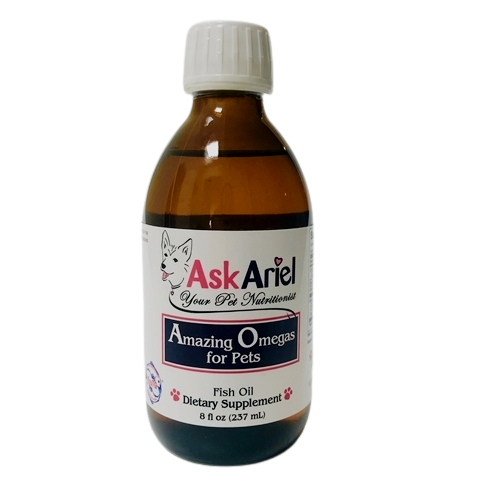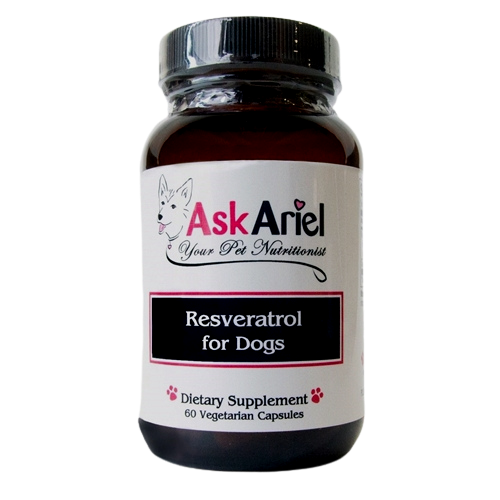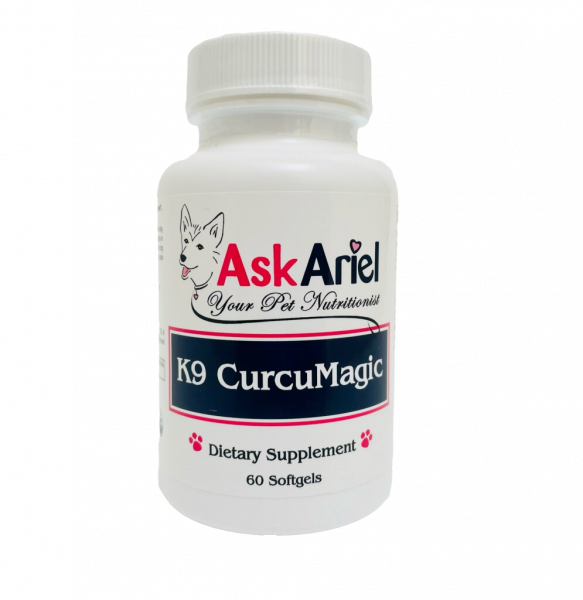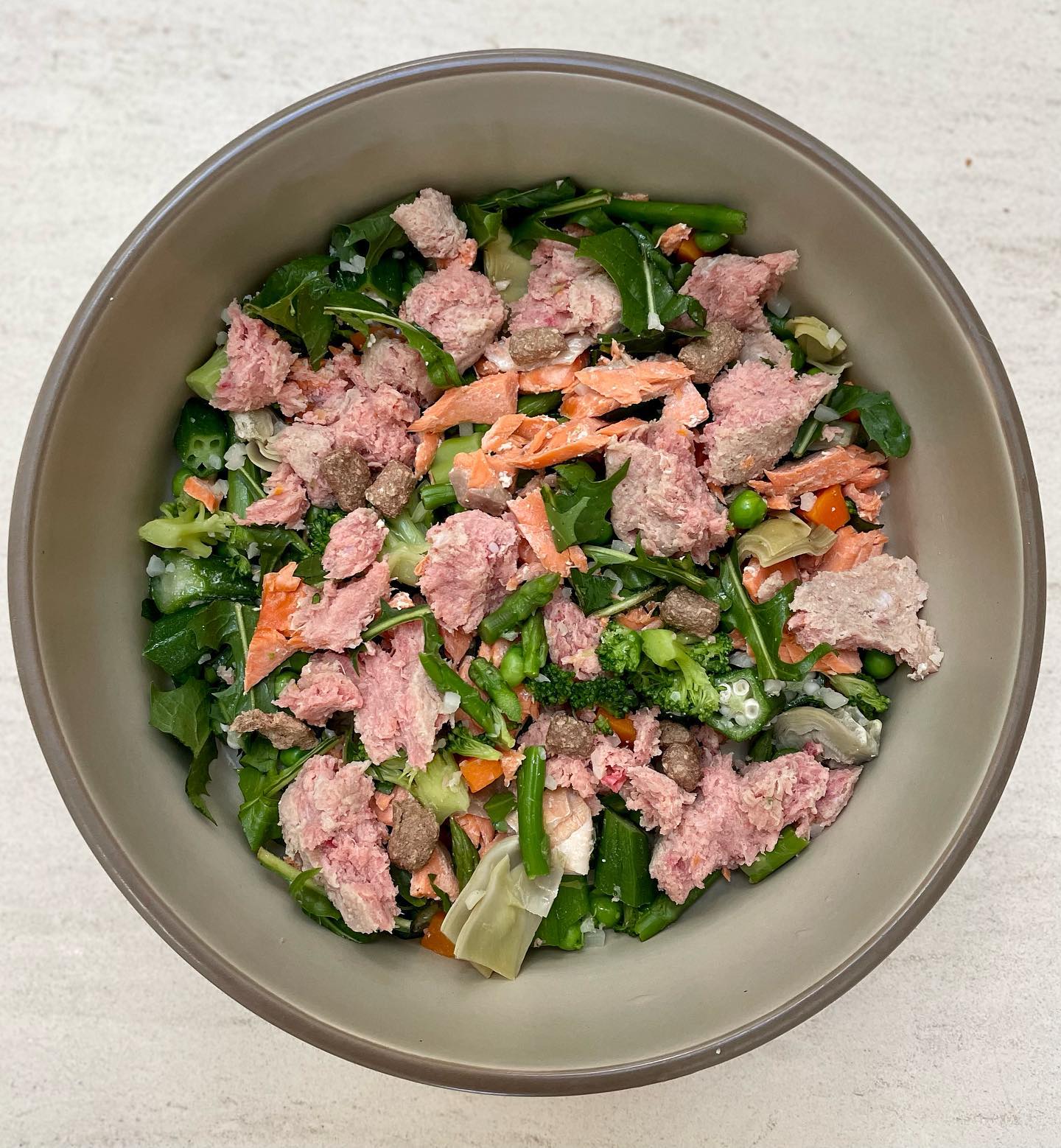Dog Cancer Support Supplements
You’ve just received the difficult news that your pet has been diagnosed with cancer and are looking for natural ways to support your dog’s health and quality of life. Dog cancer supplements such as fish oil, CBD, curcumin, medicinal mushrooms and green tea, offer a complementary approach to conventional veterinary treatment.
They are not a miracle cure - they aim to enhance your dog's overall well-being and could potentially contribute to their longevity. By providing natural ingredients known for their antioxidant and anti-inflammatory properties, dog cancer supplements can help support your pet's immune system, reduce inflammation, and alleviate some of the side effects of cancer therapies.
By incorporating supplements into their dog's care regimen, pet owners can contribute to their pet's comfort and vitality during a challenging time. Below, you can see how our supplement products can help support your dog's health.
.png) OncoPet Cancer Vitamin is a proprietary blend of herbs and medicinal mushrooms that provide powerful dog cancer support. The natural ingredients in OncoPet contain polyphenols, beta-glucans and antioxidants, like D-fraction and L-ergothioneine, that boost the immune system and help regulate your dog's inflammatory response. OncoPet is one of the most comprehensive vitamins for dogs with cancer. It includes herbs to help balance the gut microbiome and reduce nausea and cancer-related fatigue. Combines well with cancer treatments from your veterinarian or veterinary oncologist. Helps pets handle chemotherapy and radiation. Excellent value. One bottle lasts up to 8 months for small dogs. OncoPet Cancer Vitamin is a proprietary blend of herbs and medicinal mushrooms that provide powerful dog cancer support. The natural ingredients in OncoPet contain polyphenols, beta-glucans and antioxidants, like D-fraction and L-ergothioneine, that boost the immune system and help regulate your dog's inflammatory response. OncoPet is one of the most comprehensive vitamins for dogs with cancer. It includes herbs to help balance the gut microbiome and reduce nausea and cancer-related fatigue. Combines well with cancer treatments from your veterinarian or veterinary oncologist. Helps pets handle chemotherapy and radiation. Excellent value. One bottle lasts up to 8 months for small dogs.
 Amazing Omegas is the highest quality, purified fish oil available for pets. It is a powerhouse of omega-3s for dogs with cancer. Amazing Omegas is a highly purified fish oil made from sardines, anchovies and mackerel processed with minimal heat to preserve the oil in its natural state. Packed in glass bottles to prevent any chemicals from plastic leaching into the oil. Naturally processed, highly bioavailable essential fatty acids with all toxins and heavy metals carefully removed. Compare the nutrient panel of this premium pet fish oil to all other brands and see the difference. Amazing Omegas is the highest quality, purified fish oil available for pets. It is a powerhouse of omega-3s for dogs with cancer. Amazing Omegas is a highly purified fish oil made from sardines, anchovies and mackerel processed with minimal heat to preserve the oil in its natural state. Packed in glass bottles to prevent any chemicals from plastic leaching into the oil. Naturally processed, highly bioavailable essential fatty acids with all toxins and heavy metals carefully removed. Compare the nutrient panel of this premium pet fish oil to all other brands and see the difference.
 Resveratrol for Dogs is an exceptional antioxidant making it one of the most important dog cancer supplements. Some owners that have dog breeds with a higher incidence of cancer, such as bichon frises, German shepherds, Labradors, golden retrievers or boxers, use Resveratrol as a supplement to prevent cancer in dogs. It acts on the process of carcinogenesis by affecting all three phases - tumor initiation, promotion and progression - and suppresses the final steps of carcinogenesis. Resveratrol is cardio-protective. Very important if your pet is undergoing radiation. Energizing, promotes longevity. Excellent for senior dogs. Resveratrol for Dogs also supports immune function. Resveratrol for Dogs is an exceptional antioxidant making it one of the most important dog cancer supplements. Some owners that have dog breeds with a higher incidence of cancer, such as bichon frises, German shepherds, Labradors, golden retrievers or boxers, use Resveratrol as a supplement to prevent cancer in dogs. It acts on the process of carcinogenesis by affecting all three phases - tumor initiation, promotion and progression - and suppresses the final steps of carcinogenesis. Resveratrol is cardio-protective. Very important if your pet is undergoing radiation. Energizing, promotes longevity. Excellent for senior dogs. Resveratrol for Dogs also supports immune function.
.png) Happy Paws Organic Hemp Extract For Dogs - Hemp extract for dogs with cancer can help reduce inflammation and support a healthy immune system. The ingredients in Happy Paws Drops are being researched for their beneficial effects on cancer. Anecdotal reports include reduced pain, inflammation and discomfort. Happy Paws contains simple ingredients: organic hemp extract and coconut oil. It’s rigorously tested for potency and purity. Each 1oz bottle contains 550mg of full spectrum hemp extract in an unflavored all-natural coconut oil base. Easy to administer and well tolerated by most dogs. 100% organic. Made in the USA. Happy Paws Organic Hemp Extract For Dogs - Hemp extract for dogs with cancer can help reduce inflammation and support a healthy immune system. The ingredients in Happy Paws Drops are being researched for their beneficial effects on cancer. Anecdotal reports include reduced pain, inflammation and discomfort. Happy Paws contains simple ingredients: organic hemp extract and coconut oil. It’s rigorously tested for potency and purity. Each 1oz bottle contains 550mg of full spectrum hemp extract in an unflavored all-natural coconut oil base. Easy to administer and well tolerated by most dogs. 100% organic. Made in the USA.
 K9 CurcuMagic is a scientifically proven natural anti-inflammatory supplement for dogs with cancer. It contains a patented combination of three curcuminoids that act as free-radical scavengers. These cancer-fighting nutrients in this unique bioactive turmeric formula help pets prevent and fight cancer. Curcumin inhibits tumor growth and may help to reduce the side effects of chemotherapy. K9 CurcuMagic absorbs best when digested with fat, especially omega-3 fatty acids (Amazing Omegas), which is why our clients use the two dog cancer supplements together. If your pet is undergoing radiation, curcumin can protect the skin. K9 CurcuMagic is a scientifically proven natural anti-inflammatory supplement for dogs with cancer. It contains a patented combination of three curcuminoids that act as free-radical scavengers. These cancer-fighting nutrients in this unique bioactive turmeric formula help pets prevent and fight cancer. Curcumin inhibits tumor growth and may help to reduce the side effects of chemotherapy. K9 CurcuMagic absorbs best when digested with fat, especially omega-3 fatty acids (Amazing Omegas), which is why our clients use the two dog cancer supplements together. If your pet is undergoing radiation, curcumin can protect the skin.
.png) Immune Harmony is a premium-quality, patented blend of plant sterols and antioxidants. This unique plant sterol supplement is well-tolerated by even the smallest pets. This dog vitamin has been successfully used in conjunction with chemotherapy and/or steroids since 2005. The sterols contained in Immune Harmony have been shown in studies to have anti-inflammatory, anti-cancer and immunomodulatory properties. No known toxicity has been found. The antioxidants protect the body from free-radical damage and an essential fatty acid complex assists in the bioavailability of these health-promoting nutrients. Excellent value: One bottle lasts between two and four months depending upon the weight of your dog. Immune Harmony is a premium-quality, patented blend of plant sterols and antioxidants. This unique plant sterol supplement is well-tolerated by even the smallest pets. This dog vitamin has been successfully used in conjunction with chemotherapy and/or steroids since 2005. The sterols contained in Immune Harmony have been shown in studies to have anti-inflammatory, anti-cancer and immunomodulatory properties. No known toxicity has been found. The antioxidants protect the body from free-radical damage and an essential fatty acid complex assists in the bioavailability of these health-promoting nutrients. Excellent value: One bottle lasts between two and four months depending upon the weight of your dog.
Murphy
"Murphy was diagnosed with Stromal Sarcoma after a tumor on her spleen was discovered (which was removed through surgery) & was given 3 months (tops) to live. The vet told us to not even bother with chemo or radiation. This all happened in early August of '06. We were desperately searching for dog cancer help for Murphy. Ask Ariel gave us a dog cancer diet for Murphy and a supplement protocol (Amazing Omegas, K9 CurcuMagic, Resveratrol for Dogs) based on her symptoms and type of cancer. It is almost as if she knows every day is a gift. Thank you for all your care and concern. Murphy sends her love :)" - Gina
Murphy was diagnosed with cancer in 2006 and lived to be 15 years old (2014) -- approx 8 years while following Ask Ariel's recommended diet and supplement protocol.
Tips of Preventing Cancer
- Healthy Diet and Exercise - Feeding a low carbohydrate diet along with regular exercise will help regulate your dog's blood sugar and support a healthy immune system. Antioxidants and omega 3 fatty acids are essential.
- Remove Toxins From Their Environments - Keep toxic substances (cleaners, lawn pesticides, cigarette smoke, etc.) away from your pet. Cigarette smoke has been linked to certain types of cancer in pets.
- Perform Wellness Exams and Laboratory Testing - Pets can't tell us when they don't feel well and often don't show signs of cancer until the disease has progressed. Regular checkups and lab tests for senior pets (every 6 months) can help detect cancer in the earlier stages.
- Be Your Pet's Advocate - We get so busy and time passes without realizing how long it's been since your dog last went to the vet. It's also easy to overlook a small sign, such as your pet's appetite waning, by thinking it's just due to old age. If you think something could be wrong or your dog just seems a little different, be sure to bring the issue to the attention of your veterinarian.
Greta
"Thrilled to have had ONE additional year...I was informed that my girl, GRETA who is closest to me, sleeps by my side, accompanies me most anywhere, etc had TWO to FOUR weeks to live at the most..I was told she had inoperable liver cancer that had already spread to her lungs and was quite widespread. I was shocked and devastated that my girl that I had taken special care of since she was about 1 yr was now going to leave way before I had hoped...Barely being able to comprehend the bad news, I prepared for the last few weeks with her. BUT, my FIRST phone call was to Susan Davis (animal nutritionist) who recommended the necessary supplements to wage WAR and give it a good fight. I listened to everything Susan told me to use and feed her...AND NOW we have surpassed the ONE YEAR mark!!! Greta has slipped down hill as of late and I realize the time is near but I AM COMPELLED to inform and shout from the mountaintops, NEVER give up and PLS Try holistic/homeopathic remedies" - Rhonda, California
Products Used: Resveratrol for Dogs, Amazing Omegas, Special SAMe, K9 CurcuMagic, Liver & Gallbladder Support, LypoZyme, Power Probiotic
Common Types of Cancers In Dogs
By educating ourselves about these common cancers, we can provide our four-legged friends with the care they need, enhance their quality of life, and increase their chances of successful treatment and recovery.
Below are links to articles with additional information about some of the most common cancers in dogs:
Cats get cancer too. Below are links to articles with more information about feline intestinal lymphoma and mast cell tumors in cats:

Recommended Diet for Dogs with Cancer
Are you trying to find the best dog cancer diet? Grains, starchy carbohydrates and food allergens can weaken immunity and contribute to long-term inflammation. Pets with cancer can benefit from a low carbohydrate diet high in omega-3s. Beef, poultry and grains (rice, barley, wheat) can be allergens for many dogs, so it is best to limit or avoid. Research has shown the importance of omega 3s for dogs with cancer, so adding baked fish, such as salmon, along with fish oil can be helpful.
Raw frozen diets are the gold standard in providing fresh nutrients for pets and are low in carbohydrates. Raw frozen diets include vegetables and omega 3s which are helpful for pets with cancer. A dog cancer diet should also include vegetables such as green beans, squash (butternut, zucchini, yellow squash), leafy greens, okra and artichoke hearts.
Ask Ariel Pet Nutritionist Susan Davis’ dog cancer diets were developed while working as a holistic pet nutritionist at VCA hospitals and a leading Southern California veterinary oncology clinic for over 10 years. Please provide your dog’s diet on the order form at checkout. Ask Ariel will include FREE diet tips for your pet on the packing slip that comes with your order.
|
|